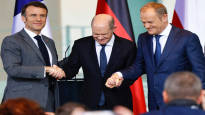Poland mediated the friction between the leaders of Germany and France, and the end result was a promise of long-range weapons to Ukraine, writes NATO special reporter Maria Stenroos.
Maria Stenroos NATO special reporter
A long handshake and one wink.
Chancellor of Germany Olaf Scholz invited the French president to Berlin Emmanuel Macron and the Prime Minister of Poland Donald Hardly.
At the end of Friday’s gathering, the leaders performed together. They managed to get their messages together this time, unlike last few weeks. However, they did not answer the journalists’ questions. Ukraine was promised new support, but they did not give details. However, the leaders’ handshake was spectacular, even embarrassingly long.
The purpose of the meeting was to mediate between the leaders of Germany and France and to search for lost leadership in Europe.
The leaders are trying to revive the so-called Weimar Triangle. Europe’s strong defense nations cooperated when Germany was in charge Angela Merkel and Tusk was the prime minister of Poland. Then the leaders changed and things cooled down. Russia’s attack on Ukraine and the weakening of European security have brought the countries together again.
Now may be the last moment trying to join forces. After Ukraine, Russia’s aggression can also target other parts of Europe, and Europe’s defense is not ready for that. There is not enough stuff in the arsenals, and many countries do not have a credible defense of their own.
In recent weeks, the differences of opinion and temperament between the leaders of Germany and France have constantly come to the fore, and the messages have been out of sync.
Scholz knocked out Macron’s idea of the possible use of ground forces in Ukraine. He came to reveal how Britain and France may already be operating in Ukraine. Scholz warned against becoming a party to the war, while Macron warned against cowardice.
In Berlin, the leaders wanted to reassurethat things are not as bad as they seem.
According to Scholz, more weapons will be delivered to Ukraine, including long-range missiles requested by Ukraine. This is done through the Ramstein Group, which coordinates armed support to Ukraine.
Scholz also emphasized that Europe is not at war with Russia. Macron, on the other hand, said that Europe will do everything to prevent Russia from winning the war.
The awakening of Europe has come From the other side of the Atlantic.
The United States has been Ukraine’s biggest supporter. Europe has delivered weapons, but too slowly and too little. It has not got its arms production up and running, even though the war has been going on for two years.
Now, when the US presidential election creates uncertainty and its support is struggling, Europe has started to panic. The problems of the leaders of its biggest states are the problems of the whole of Europe.
Germany is the second largest supporter of Ukraine. However, other European countries have constantly accused it of snobbery.
Scholz’s line in aid of Ukraine is reticent, partly for domestic political reasons. The majority of Germans are against it handing over long-range weapons to Ukraine. Scholz’s own popularity is not high. He has to watch out for the AfD party, which is growing on its success in the polls, which is also critical of supporting Ukraine. The positions of the German government and Scholz’s own party on arming Ukraine are scattered.
France’s Macron is a former Russian connoisseur, which has completely reversed its policy. Last Thursday, Macron repeated that sending ground troops to Ukraine in the future cannot be ruled out. He says that Russia threatens the security of all of Europe, including France. However, Macron’s initiatives have so surprisingly failed that even his own diplomats do not want to keep up.
Because of the war in Ukraine The Baltic and Eastern European countries have increased their weight. Poland can be a unifying factor in Europe, now that the Law and Justice party, which trampled on the rule of law, is no longer in government.
Tusk, Macron and Scholz need each other. Once in Europe, no country is able to take the political lead alone, it could be shared between three strong ones.
